There’s a big controversy about whether business owners with traditional religious beliefs should be coerced by government into doing business with gay couples who want to get married.
Back in 2015, I explained that the real issue is freedom of association, not whether gay marriage is right or wrong (I’ve always wondered why government should have any role in marriage, but that’s a separate topic).
It’s time to revisit this issue now that the Supreme Court has released its decision on the case involving a Colorado baker who didn’t want to decorate a cake for a gay wedding. The Wall Street Journal opines that the decision was in favor of the baker, but on very narrow grounds.
The Supreme Court ruled 7-2 Monday for a baker who refused to custom-bake a cake for a same-sex wedding out of sincere religious belief. …this apparent victory for religious freedom may be short-lived. …While seven Justices on the High Court held for Mr. Phillips, the majority decision could have gone the other way had some facts been different. Writing for the majority, Justice Kennedy notes that Mr. Phillips was “entitled to a neutral decision-maker.” …As is his wont, Justice Kennedy strains to avoid a clear and decisive ruling. While “religious and philosophical objections [to same-sex marriage] are protected, it is a general rule that such objections” don’t allow the denial of services “under a neutral and generally applicable public accommodations law,” he writes. Perhaps the best that can be said is that florists, make-up artists, photographers and other people of faith have lived to fight another day. A ruling against Mr. Phillips would have been catastrophic for religious liberty, but the majority’s muddle provides only gossamer protection. …The message is that governments can punish religious beliefs as long as they keep their animus toward religion in the closet.
could have gone the other way had some facts been different. Writing for the majority, Justice Kennedy notes that Mr. Phillips was “entitled to a neutral decision-maker.” …As is his wont, Justice Kennedy strains to avoid a clear and decisive ruling. While “religious and philosophical objections [to same-sex marriage] are protected, it is a general rule that such objections” don’t allow the denial of services “under a neutral and generally applicable public accommodations law,” he writes. Perhaps the best that can be said is that florists, make-up artists, photographers and other people of faith have lived to fight another day. A ruling against Mr. Phillips would have been catastrophic for religious liberty, but the majority’s muddle provides only gossamer protection. …The message is that governments can punish religious beliefs as long as they keep their animus toward religion in the closet.
Since I’m not a lawyer, I’m not sure what to think about the Court’s contorted decision.
But as a libertarian, I think the government should not be involved.
Jeff Jacoby of the Boston Globe understands what the issue is all about. Here’s some of what he wrote shortly before Trump’s inauguration.
Freedom of association is a vital human right. …I support…the singers who refuse to sing for Trump, the fashion designers who refuse to design, the landlords who refuse to rent, the dancers who refuse to dance. No one should be forced to play a role in a celebration they want nothing to do with, or to hire themselves out to clients they would prefer not to serve. …if a caterer turns down a request to prepare the meals for Trump’s inauguration?  Or a florist declines to provide the floral arrangements? Or a calligrapher says “thanks but no thanks” to addressing the invitations? I’d back them, too, and for reasons having nothing to do with Trump or Republicans or inaugurations — and everything to do with freedom of association. The right to discriminate — to choose with whom we will and won’t associate — is vital to human liberty. A dressmaker who can’t say no to a commission to design a gown isn’t free, and it doesn’t matter whether the gown is for a first lady or for the brides in a lesbian wedding. A liberal baker who declines to create a lavish cake decorated with the words “Congratulations, President Trump” is entitled to as much deference as a black baker who declines to decorate a cake with the Confederate flag, or a Muslim baker who declines to decorate a cake with the message “No Muslim Immigrants.” …Tolerance and pluralism are important values in a free society. So are choice and association. Your choices may not be mine; my preferred associations may not be yours. In a diverse, live-and-let-live culture, our differences are manageable — as long as government doesn’t interfere.
Or a florist declines to provide the floral arrangements? Or a calligrapher says “thanks but no thanks” to addressing the invitations? I’d back them, too, and for reasons having nothing to do with Trump or Republicans or inaugurations — and everything to do with freedom of association. The right to discriminate — to choose with whom we will and won’t associate — is vital to human liberty. A dressmaker who can’t say no to a commission to design a gown isn’t free, and it doesn’t matter whether the gown is for a first lady or for the brides in a lesbian wedding. A liberal baker who declines to create a lavish cake decorated with the words “Congratulations, President Trump” is entitled to as much deference as a black baker who declines to decorate a cake with the Confederate flag, or a Muslim baker who declines to decorate a cake with the message “No Muslim Immigrants.” …Tolerance and pluralism are important values in a free society. So are choice and association. Your choices may not be mine; my preferred associations may not be yours. In a diverse, live-and-let-live culture, our differences are manageable — as long as government doesn’t interfere.
This controversy should have nothing to do with sexual preference. One of my former interns is gay, but does not want to force others to associate with him.
Being a gay libertarian…you are a pariah among your peers. …So-called civil rights groups like the American Civil Rights Union…say…that “when businesses are open to the public, they’re supposed to be open to everyone.” …Well, folks, I am gay myself – I am even married – and I stand by Philipps’ right to discriminate against whoever he wants. That, of course, makes me a traitor, a turkey voting for Thanksgiving  – and if I were African American, it would also make me an Uncle Tom. …many liberals stand by the ACLU’s faulty reasoning… Faulty because it implies that, once you start selling a product or service, you automatically lose your right to freely and voluntarily interact with other people. It’s opened to the public, so it suddenly becomes public “property”… Following that logic, a Muslim baker would be forced to make a cake with Mohammed’s face on it – an unspeakable moral crime in Islam – Hooters would have to hire anyone as a server and gay bathhouses would have to welcome female patrons. …the infamous Jim Crow laws not only maintained an apartheid-like state for African Americans, but they also dictated how private businesses needed to interact with these people. …instead of having government force businesses to serve anyone, I want it to let them discriminate in the open. This way, I know exactly where not to do business. Because even if I were heterosexual, I would very likely boycott businesses that discriminate on arbitrary traits like sexual orientation or skin color. It’s not a crime – no one’s life or property is endangered by this refusal of doing business – but it goes against my moral standards of treating every human being as an equal.
– and if I were African American, it would also make me an Uncle Tom. …many liberals stand by the ACLU’s faulty reasoning… Faulty because it implies that, once you start selling a product or service, you automatically lose your right to freely and voluntarily interact with other people. It’s opened to the public, so it suddenly becomes public “property”… Following that logic, a Muslim baker would be forced to make a cake with Mohammed’s face on it – an unspeakable moral crime in Islam – Hooters would have to hire anyone as a server and gay bathhouses would have to welcome female patrons. …the infamous Jim Crow laws not only maintained an apartheid-like state for African Americans, but they also dictated how private businesses needed to interact with these people. …instead of having government force businesses to serve anyone, I want it to let them discriminate in the open. This way, I know exactly where not to do business. Because even if I were heterosexual, I would very likely boycott businesses that discriminate on arbitrary traits like sexual orientation or skin color. It’s not a crime – no one’s life or property is endangered by this refusal of doing business – but it goes against my moral standards of treating every human being as an equal.
Excellent analysis. Indeed, I’d like to take partial credit. Except Pierre already was a solid libertarian when he started working for me.
Here’s another column with the same perspective, which appeared in the Federalist.
…it should be simple to appreciate why religious people who deeply oppose socially changing marriage to include same-sex couples would not wish to endorse or participate in a same-sex wedding. …Masterpiece Cakeshop, as with many caterers, florists, and photographers, has merely declined to participate in an event or associate their brand with that event. Why do LGBT activists perceive this as a direct attack on the validation of their relationships? …I would not seek employment or request a table at a Planned Parenthood event and expect them to accommodate me. Why would I help them raise money or support their business model? If I encountered an individual morally uncomfortable with participating in an activity with me and my boyfriend, such as couple photos or planning a party, it would be uncomfortable for me to force her. …I would be taken aback by a rejection, I would feel it is my responsibility to choose another photographer rather than force another person to violate her faith for my satisfaction.
has merely declined to participate in an event or associate their brand with that event. Why do LGBT activists perceive this as a direct attack on the validation of their relationships? …I would not seek employment or request a table at a Planned Parenthood event and expect them to accommodate me. Why would I help them raise money or support their business model? If I encountered an individual morally uncomfortable with participating in an activity with me and my boyfriend, such as couple photos or planning a party, it would be uncomfortable for me to force her. …I would be taken aback by a rejection, I would feel it is my responsibility to choose another photographer rather than force another person to violate her faith for my satisfaction.
Interestingly, some folks on the left openly express their affinity for discrimination. Here’s Michael Moore exercising his right not to do business with theaters in North Carolina, along with a comment by someone who wants Moore to be philosophically consistent.

Ouch, that retort had to leave a mark. Though Moore isn’t bothered by hypocrisy, so he probably doesn’t care.
And speaking of hypocrisy, I wonder what my friends on the left think of the following examples of discrimination.
Here’s freedom of association in action, as reported by the Washington Times.
A boy whose letter to President Trump made national headlines last month reportedly wanted a pro-Trump cake for his birthday party, but his mother was unable to find a baker willing to fulfill the order.  …his mother “made him one herself, because she couldn’t find a bakery willing and able to do it.” Michael P. Farris is president, CEO and general counsel of the Alliance Defending Freedom, …wondered why bakers are allowed to decline to make birthday cakes supporting Mr. Trump, but not wedding cakes supporting same-sex marriage. …“The fact is that these cake shops have freedom of speech,” he continued. “They have the right to decline to use their artistic talents to celebrate events or promote messages that violate their beliefs, even if it offends a nice little kid.”
…his mother “made him one herself, because she couldn’t find a bakery willing and able to do it.” Michael P. Farris is president, CEO and general counsel of the Alliance Defending Freedom, …wondered why bakers are allowed to decline to make birthday cakes supporting Mr. Trump, but not wedding cakes supporting same-sex marriage. …“The fact is that these cake shops have freedom of speech,” he continued. “They have the right to decline to use their artistic talents to celebrate events or promote messages that violate their beliefs, even if it offends a nice little kid.”
Kudos to Mr. Farris. He wants sauce for the goose to be sauce for the gander. But more important, he wants the right sauce, i.e., nobody should be coerced by government to associate with others.
The New York Post highlights another example of how freedom of association works.
Bartenders at a West Village hot spot served up discrimination — with a liberal twist — refusing to serve a customer because he was wearing a “Make America Great Again” hat, according to a lawsuit. …Greg Piatek, 30, an accountant from Philadelphia, claims he was snubbed…by workers at The Happiest Hour on West 10th Street over his conservative fashion statement… “Anyone who supports Trump — or believes what you believe — is not welcome here! And you need to leave right now because we won’t serve you!” Piatek claims he was told as he was shown the door by a manager. …Piatek’s lawyer Paul Liggieri called the incident “humiliating,” saying it was his client’s “saddest hour.”
according to a lawsuit. …Greg Piatek, 30, an accountant from Philadelphia, claims he was snubbed…by workers at The Happiest Hour on West 10th Street over his conservative fashion statement… “Anyone who supports Trump — or believes what you believe — is not welcome here! And you need to leave right now because we won’t serve you!” Piatek claims he was told as he was shown the door by a manager. …Piatek’s lawyer Paul Liggieri called the incident “humiliating,” saying it was his client’s “saddest hour.”
I think Mr. Piatek is being a snowflake. If some establishment didn’t want to serve me because of my libertarian values, I would shrug my shoulders and find a place that did value my cash.
I just wish folks on the left had the same perspective. Moreover, I wonder if they’ve considered the implication of their approach. This humorous item from Libertarian Reddit could become reality if the government had the power to force all of us to do business with each other.
And here’s another story showing how people choose to discriminate.
Last but not least, Marissa Mayer explains for FEE how she doesn’t think government should get involved solely because someone does not want to do business with her.
This week I was denied a service because the company’s values are at odds with the values that Alliance Defending Freedom stands for — values I personally hold. And guess what? I’m okay with that. …Using my work information, I signed up for an online course created by Moceanic, a team of talented fundraisers who have created a coaching and training business to help writers better connect with donors. …What I didn’t know when I signed up for the course, however, is that Moceanic does a lot of work with organizations such as the ACLU, Planned Parenthood, and LGBT activist organizations. …ADF and these organizations don’t exactly share the same values. …I received an email notifying me that they had refunded the cost of the course with no explanation as to why. I was a little perplexed by the email… That’s when I starting digging deeper into the brains behind Moceanic, and it didn’t take long for me to discover the values statement on their website. …”we reserve the right to choose not to train people working directly for, or on behalf of, organisations whose missions or values do not align with ours.” …I get it… Moceanic shouldn’t be forced to coach me on how to speak in a way that generates excitement and engagement for a cause that they disagree with any more than Jack should have to create a cake celebrating a marriage that conflicts with his beliefs.
a team of talented fundraisers who have created a coaching and training business to help writers better connect with donors. …What I didn’t know when I signed up for the course, however, is that Moceanic does a lot of work with organizations such as the ACLU, Planned Parenthood, and LGBT activist organizations. …ADF and these organizations don’t exactly share the same values. …I received an email notifying me that they had refunded the cost of the course with no explanation as to why. I was a little perplexed by the email… That’s when I starting digging deeper into the brains behind Moceanic, and it didn’t take long for me to discover the values statement on their website. …”we reserve the right to choose not to train people working directly for, or on behalf of, organisations whose missions or values do not align with ours.” …I get it… Moceanic shouldn’t be forced to coach me on how to speak in a way that generates excitement and engagement for a cause that they disagree with any more than Jack should have to create a cake celebrating a marriage that conflicts with his beliefs.
Marissa is intellectually consistent and practices tolerance.
Too bad the same can’t be said for many other people.
I’ll close by noting that we all discriminate. We discriminate in the foods we buy, the friends we choose, the people we love, and the businesses we patronize. And I don’t think the government should coerce us to make different choices.
That being said, we also should recognize that some choices are fine and some choices are bad.
Because I have the taste buds of a child, I discriminate against restaurants with spicy food. Plenty of my friends tease me for my limited tastes, but I can’t imagine anyone (other than my mother when I was a kid) wanting to force me to eat foods I don’t like.
But what if I wanted to discriminate against people simply because of their race or religion? In that case, I would hope my friends would cease to be my friends and instead would upbraid me for my moral failings (I also hope some of them would be like Daryl Davis or Matthew Stevenson and try to rescue me from such odious forms of collectivism).
However, I wouldn’t want them to enlist government coercion. Believing in free speech also means allowing reprehensible forms of free speech. Believing in a free press also means allowing awful viewpoints. Believing in freedom of association means allowing disgusting forms of discrimination.
So bake a cake or don’t bake a cake. But if you have a bad reason for not baking a cake, you won’t be getting my business (even if your discrimination is economically rational).
Read Full Post »
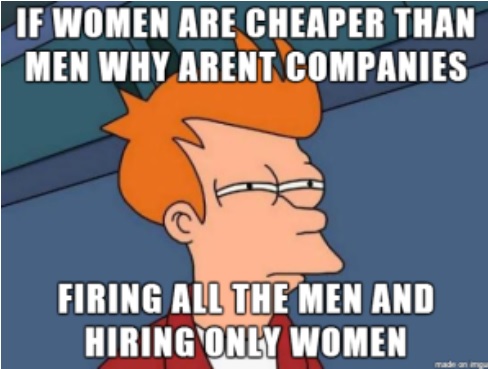 maximize profits.
maximize profits.A 2008 study cited by the Nobel committee found that for women who had a labor-force attachment like that of men, the choice of college major accounted for more than half of the gender earnings gap: Women are substantially underrepresented in STEM fields. …Ms. Goldin, Mr. Katz and Marianne Bertrand of the University of Chicago made that comparison in a 2010 study, which found that the primary factor behind long-term differences in earning was child-rearing. …In a 2010 study, Ms. Goldin and Mr. Katz pointed out that women often receive a wage penalty for demanding a job that’s flexible enough for the woman to be the “on-call” parent. Men are more apt to receive a wage premium for being willing to be the “on-call” employee.
It widens only later, usually after a woman has a child. This is true despite women’s tremendous gains in education, legislative victories and increasingly diverse career choices, and despite more progressive thinking taking hold about gender roles. Goldin argues that the persistence of the gender waoge gap is in part because of the rise of “greedy work,” or the idea that employees who are willing to work longer hours get rewarded so much more — disproportionally more than the extra time put in. She has found that doubling the hours worked typically results in much more than double the earnings; inversely, halving the hours typically results in much less than half the earnings.
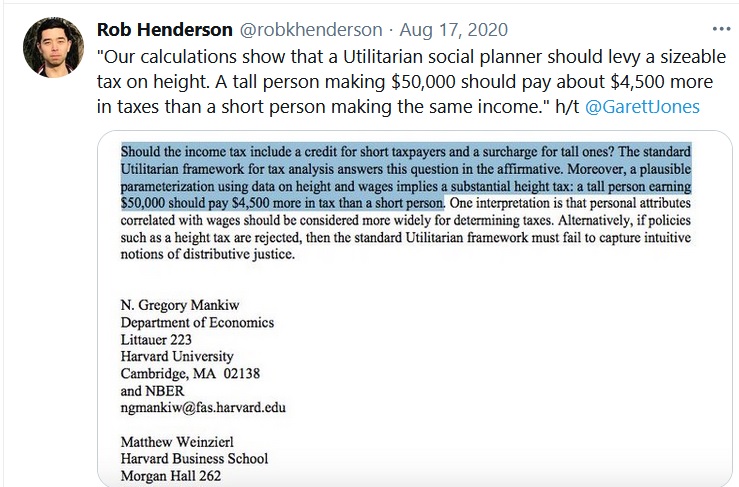

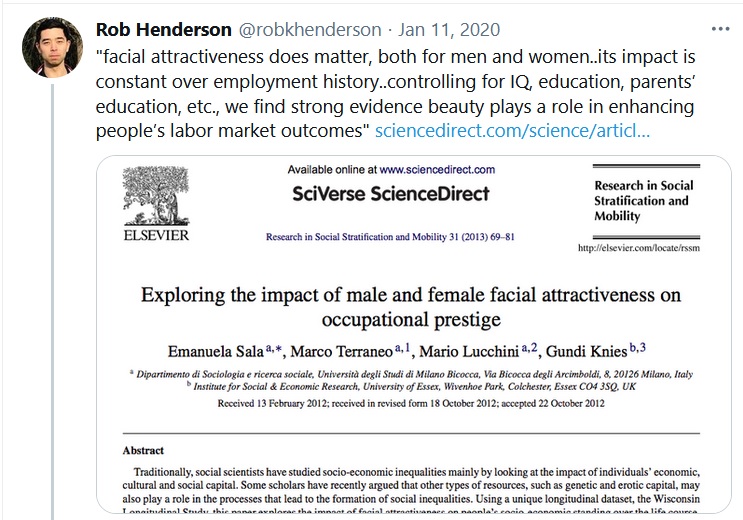

























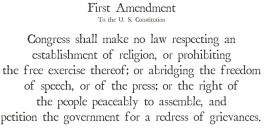

 He starts by pointing out that Sterling certainly wasn’t racist when making decisions about what basketball players to employ.
He starts by pointing out that Sterling certainly wasn’t racist when making decisions about what basketball players to employ.




